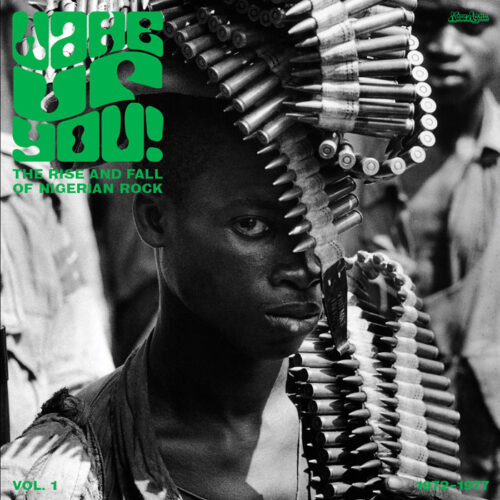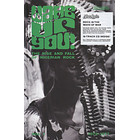There are three kinds of stereotypical images that the ‘western world’ usually associates with Africa: cheerful black people with white teeth in traditional clothing; well-intending whites grasping poor – yet happy – black children in their arms (currently quite popular on Tinde😉 and, of course, pictures of war. Emaciated children carrying AK 47 rifles, groups of angry young men posing with machetes, fists raised in the air, contorted angry faces, blood. These images speak volumes about our prejudices about this culturally versatile continent, which Europeans more than anyone else have coated with war and repression. Maybe that’s the reason why the cover of the compilation »Wake Up You! The Rise And Fall Of Nigerian Rock, 1972-1977«, released by the Stones-Throw-spin-off Now Again, shows exactly that kind of image: A young man staring into the camera, expressionless, head and shoulder draped in a cartridge belt. It’s an impressive picture; its martial implications come across as almost cynical in their aestheticization. However, it reflects the historical development of the compilation’s 18 tracks and of the photo- and text-book of 100 pages by Uchenna Ikonne, musical scientist and re-discoverer of William Onyeabor. From 1967 on, the West-African state fell into instability, leading to a tangible and violent civil war. Of course, one could doubt whether the funky, decidedly unpolitical rock by the Formulars Dance Band, Wrinkar Experience or Funkees – to name only three highlights – had an actual healing impact on Nigeria’s society, as the label states. After all, military dictatorships started to occupy the country in the beginning of the eighties. However, »Wake Up You!« achieves something remarkable: it allows us to look behind all those pictures and to get to know incredible discoveries beyond Fela Kuti, one of Nigeria’s greatest sons. The extensive collection offers everything from swinging funk (Ify Jerry Krusade, Aktion), melancholic psychedelia (Onye Ije) all the way to punk-like eruptions (War-Head Constriction) and rhythmically local tracks (Hygrades, P.R.O.), and thereby passes through a remarkable variety of stylistic facets. In the same way that Africa can’t be portrayed through three different categories of images, it’s impossible to compartmentalize Nigerian rock music of the 70s. Thankfully, this also means that there is so much more to explore, making us hope that the second edition of »Wake Up You!« is already under way.
Altin Gün
Garip
Glitterbeat


